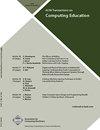用自动评估系统评估提交限制和退步处罚以改善学生行为
IF 3.2
3区 工程技术
Q1 EDUCATION, SCIENTIFIC DISCIPLINES
引用次数: 0
摘要
目标。自动评估系统被广泛用于为学生提供快速反馈并缩短评分时间。尽管提高了效率和改善了教学效果,但一个持续的挑战是,在与自动评估系统互动时,减轻学生的不良行为,包括大量提交、试错,以及依靠评分反馈来解决问题。这些行为不仅会对学生的学习产生负面影响,还会对系统资源产生重大影响。这项研究定量地考察了利用提交政策(如限制提交数量和应用回归惩罚)如何减少学生的负面行为。假设这两种提交政策都会对学生行为产生重大影响,并减少提交数量和学生表现的退步。研究问题评估了对学生行为的影响,确定哪种提交政策最有效,以及学生更喜欢什么提交政策。参与者。这项研究涉及不列颠哥伦比亚大学这所研究密集型大学的两个不同学期的两个课程部分,共有224名学生。在一个大型的三年级数据库课程中,使用自动评估系统对学生进行了评估。研究方法。这两个课程部分使用了一个自动评估系统来构建作业和考试的数据库设计图。第一节对作业和考试的提交数量没有限制。第二节对考试有限制,但对作业没有限制。在期中考试中,参与者被随机分配对提交的总数量有限制或无限制提交,但如果评分答案低于前一次提交,则会受到回归惩罚。在期末考试中,学生可以选择自己的提交政策。比较了课程部分和不同提交政策之间的学生学习成绩和提交情况。调查结果。不受限制地使用自动评分系统会导致不良学生行为的频繁发生,包括试错猜测,以及在没有足够独立思考的情况下缩短提交时间。限制最大提交量和使用回归惩罚的提交策略都能显著减少85%的这些行为。总的来说,学生更喜欢最大提交限制,并表现出改善的行为和教育成果。结论。当用于与设计和编程相关的较大问题时,自动评估系统在部署时具有提交限制(最大尝试次数或回归惩罚),既有利于改善学生的学习行为,也有利于降低系统的计算成本。这对总结性评估尤其重要,但对形成性评估的合理限制也很有价值。本文章由计算机程序翻译,如有差异,请以英文原文为准。
Evaluation of Submission Limits and Regression Penalties to Improve Student Behavior with Automatic Assessment Systems
Objectives. Automatic assessment systems are widely used to provide rapid feedback for students and reduce grading time. Despite the benefits of increased efficiency and improved pedagogical outcomes, an ongoing challenge is mitigating poor student behaviors when interacting with automatic assessment systems including numerous submissions, trial-and-error, and relying on marking feedback for problem solving. These behaviors negatively affect student learning as well as have significant impact on system resources. This research quantitatively examines how utilizing submission policies such as limiting the number of submissions and applying regression penalties can reduce negative student behaviors. The hypothesis is that both submission policies will have a significant impact on student behavior and reduce both the number of submissions and regressions in student performance. The research questions evaluate the impact on student behavior, determine which submission policy is the most effective, and what submission policy is preferred by students. Participants. The study involved two course sections in two different semesters consisting of a total of 224 students at the University of British Columbia, a research-intensive university. The students were evaluated using an automated assessment system in a large third year database course. Study Methods. The two course sections used an automated assessment system for constructing database design diagrams for assignments and exams. The first section had no limits on the number of submissions for both assignments and exams. The second section had limits for the exams but no limits on assignments. On the midterm, participants were randomly assigned to have either a restriction on the total number of submissions or unlimited submissions but with regression penalties if a graded answer was lower than a previous submission. On the final exam, students were given the option of selecting their submission policy. Student academic performance and submission profiles were compared between the course sections and the different submission policies. Findings. Unrestricted use of automatic grading systems results in high occurrence of undesirable student behavior including trial-and-error guessing and reduced time between submissions without sufficient independent thought. Both submission policies of limiting maximum submissions and utilizing regression penalties significantly reduce these behaviors by up to 85%. Overall, students prefer maximum submission limits, and demonstrate improved behavior and educational outcomes. Conclusions. Automated assessment systems when used for larger problems related to design and programming have benefits when deployed with submission restrictions (maximum attempts or regression penalty) for both improved student learning behaviors and to reduce the computational costs for the system. This is especially important for summative assessment but reasonable limits for formative assessments are also valuable.
求助全文
通过发布文献求助,成功后即可免费获取论文全文。
去求助
来源期刊

ACM Transactions on Computing Education
EDUCATION, SCIENTIFIC DISCIPLINES-
CiteScore
6.50
自引率
16.70%
发文量
66
期刊介绍:
ACM Transactions on Computing Education (TOCE) (formerly named JERIC, Journal on Educational Resources in Computing) covers diverse aspects of computing education: traditional computer science, computer engineering, information technology, and informatics; emerging aspects of computing; and applications of computing to other disciplines. The common characteristics shared by these papers are a scholarly approach to teaching and learning, a broad appeal to educational practitioners, and a clear connection to student learning.
 求助内容:
求助内容: 应助结果提醒方式:
应助结果提醒方式:


